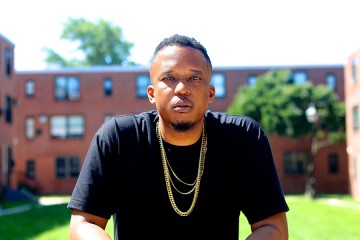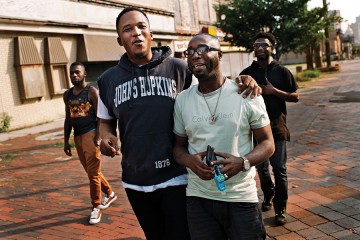Baltimore-born writer and author D. Watkins opened up his Milton S. Eisenhower Symposium lecture Wednesday evening by declaring, "Tonight is going to be loose."
Watkins is described in a recent Johns Hopkins Magazine profile as "a walking contradiction": a former drug dealer who earned a master's degree from JHU's School of Education in 2011. His debut book, The Beast Side: Living and Dying While Black in America, is not only, as the dust jacket says, a collection of "searing dispatches from the urban zones where African-American men have become an endangered species." It's also, in Watkins' own words, "a love story to the people of Baltimore."
Watkins' lecture focused on the "people's perspective" of the Baltimore uprising, the series of protests—both peaceful and violent—following the death of Freddie Gray in police custody. The events thrust Baltimore into the national spotlight and into an ongoing national conversation about police violence and race.
He read a harrowing passage from the introduction of The Beast Side in which he lists the names of 18 people killed by police, concluding that, "for black America, this is wartime."
Rather than focusing on the unrest in Baltimore in late April, Watkins delivered a broader message of compassion: "The people killed in these manners, they're just like us," he said. "We come from a world of generalizations, but we're not all one thing."
In a recent Baltimore Sun column, Watkins, who was born and raised in East Baltimore, spoke out against being considered "the voice of the people." Throughout the lecture Wednesday, Watkins discussed what he called "the multiple faces of activism."
"I want to talk about my role, your role, and the role of anybody who wants to make a difference," he said.
Members of the JHU community attending the lecture responded to this charge by raising challenging questions about their own experiences and the university's response during the uprising.
"What are the responsibilities of students to respond to messages of racism occurring on campus?" one student asked.
"Leaders, including student leaders, are responsible for challenging racism," Watkins said. "You have to unite. This is a great place filled with brilliant people. You're all brilliant people, and you deserve for your voices to be heard."
When a staff member asked about engaging students in discussions of race, Watkins encouraged group meetings. "Go wherever the students are grouping," he said. "Get them out of their cliques, start the conversation.
"The best critique is creation," Watkins added, alluding to what he says is his own motivation for writing: the erasure of the African-American experience from mainstream media. If a person's perspective isn't being shared, "you have to get those stories out there," Watkins said.
In other words, anyone can participate in activism. Anyone can make a difference. Anyone's voice can be heard.
Established in 1967, the Milton S. Eisenhower Symposium is a widely acclaimed, student-run lecture series sponsored by Johns Hopkins University. Upcoming speakers this fall include Joe Lieberman, Alan Dershowitz, Ava Duvernay, and Josh Ostrovsky.
Posted in Arts+Culture, University News, Student Life, Politics+Society
Tagged baltimore, race, writing, d. watkins, baltimore unrest









